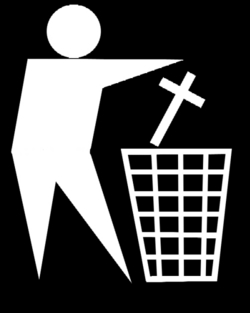|
|||||||||||||
|
the Definition of Catholicism? By Punkerslut
Today, there are more members of Catholicism than any other subdivision or sect of Christianity. [*1] [*2] However, not all believers of Catholicism are aware of the exact nature of their international church. Like those of other faiths, they are drawn to the religion less because of the church's organization and more because of message of the scripture. Being members of a church, for Catholics, is just a way of fulfilling their commitment to religion. Along with it, though, they swallow the authority of the pope, as though he were the grand dictator of their minds and thoughts. Catholics do not quite understand that their religion is not defined by the scripture, but by the authority and the rule of the pope. The choice of scripture is in the hands of the pope and the church authorities. Which gospel, or account of Jesus' life, is considered holy, is also a matter settled by the Vatican. There are several gospels besides the four accepted by the church, including the Gospel of Judas, Peter, Thomas, and Marcion. These were also the written around the time when Christ is alleged to have lived, but it was the choice of the Catholic Church to accept Mark, Matthew, Luke, and John. Any other gospel is not considered to be holy scripture, and this was one of the earliest decisions of the church's ruling elite. [*3] The Catholic masses may consider themselves to have a closer relationship with Jesus than with the Pope. They do not quite realize that exactly how they see Jesus, according to what is considered holy, was a choice of the pope. Their vision of what Christ meant and lived for is still shaped by the Vatican's powers. But this even extends to Protestants, who may consider themselves completely opposed to the hierarchy and power structure of Catholicism. The gospels they consider as holy were inherited from the instruction and education designed by the pope. Their beliefs and ideals, which they may consider to be completely anti-Catholic, are still defined by the government-like religion of Catholicism. There are multiple accounts of Christ's life, but the ones considered holy were a choice of the papacy; only some of the words attributed to Christ are given to the believers as their doctrine and belief. This is a tradition that Protestant and non-Catholic churches have very rarely broken with. Even how the message is given and interpreted is a matter that the Catholic Church defines clearly. At the Council of Toulouse, in 1229 AD, the Church banned possession of a Bible by anyone who was not a priest. It was completely unavailable, except for those who were able to obtain a copy with special permission. Even then, it was strictly forbidden to allow a commoner to have possession of a Bible that was translated from Latin into the local language. [*4] [*5]
Every obstacle was made to prohibit people from reading the Bible on their own. It was something considered so sacred that it must be read to them. First the Catholic Church defines what books are considered holy; and then, it chooses among the selected scripture what ought to be fed to the sheep. Today, it may take a different approach, allowing its own believers to read the text that's supposedly what their faith is based upon. But for the majority of the Catholic Church's history, they have refused to allow their own followers to read the words of their god. The church has behaved more like a state than like a society. The church has determined what is holy enough to give to the pew-holders and what they are personally allowed to read of god's message. With so many great shackles wrapped around the soul and barriers place within the mind, the church naturally forbids critical discussion of the religious matter. It openly and warmly welcomes those who praise the pope, the church, and their decisions. But, anything that differs from the established norm becomes a heresy. Members of the church are expelled, and in earlier times, they were also executed. Up to 30,000 protestants were killed by Catholic forces during the St. Barthomolew's Day Massacre in Paris, 1572. [*6] Between 1184 and 1230's, believing in anything besides Catholicism was threatened with death by flames in Europe. [*7] Similarly, a Spanish Inquisition operating between 1478 and 1833 killed thousands of heretics. [*8] Other forms of religious torture and execution existed with the Portuguese Inquisition [*9] and the Roman Inquisition. [*10] And, after cooperating and making compromises with the Nazis, the Catholic Church found out about the mass executions in concentrations -- and said absolutely nothing. [*11] More than that, the Catholic priests assisted the Nazis in escaping prosecution by the Allied forces. [*12] The Catholic cannot read all of the scripture attributed to their god, the version that they are allowed to hear is edited and modified, and finally, discussion of the matter at all is entirely prohibited. Catholicism is not essentially so much a religion, as it is the fanatical devotion to the rules and policies of the pope. It is, ultimately, belief in the ruler and master of the church; belief in the religious scripture is only possible, because the governor of the church chose it. While it may be called a religion, Catholicism technically has the form of a cult. Its principles are not based so much on following ideas and beliefs, but on obedience and submission to a single personality.
Punkerslut, Resources *1. "CIA World Factbook," by the United States Government Central Intelligence Agency, 2009, cia.gov, last updated on March 4, 2010.
|



